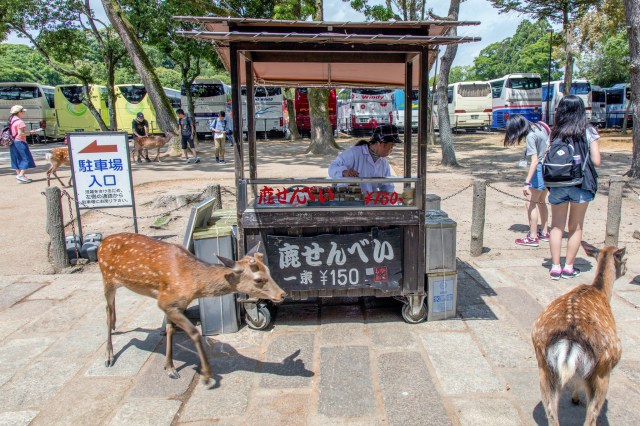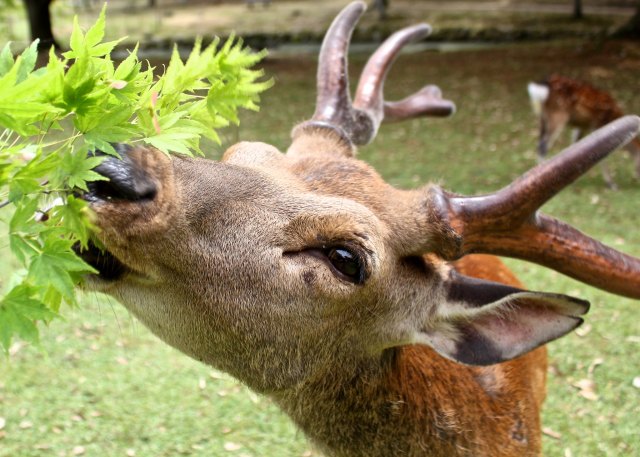
Increasing numbers of the nationally protected species are being affected by plastic bag consumption.
One of the highlights of a visit to Nara is the chance to walk amongst the city’s free-roaming deer. And with more than two million foreign visitors last year alone, some of the deer in the area have been so well-fed by day trippers that they find it hard to stand on their feet during holiday periods.
However, it appears that some tourists have been feeding these nationally protected animals something other than the deer-friendly senbei crackers sold by vendors in the area. According to a recent report from the Nara Deer Preservation Foundation, the animals have been eating plastic, which has led to the deaths of a number of deer in recent months.
▼ A senbei vendor in Nara.
A veterinarian from the foundation said a sickly looking deer was found near Todaiji temple in Nara Park on 23 March, and although they attempted to feed it, it refused to eat. The severely weak 17-year-old female deer–which weighed 30 kilograms (66 pounds), 10 kilograms below the healthy weight range–died the next day.
An autopsy revealed that the stomach of the animal was almost entirely filled with hardened material that looked like a clump of polyethylene bags. The mass weighed 3.2 kilograms (7 pounds).
Like cows and sheep, deer chew their cud as part of a process called rumination in order to digest nutrients in plant-based foods. The food first enters the rumen, one of their four-chambered stomachs, where it’s broken down by bacteria before being regurgitated for the animal to chew in order to be fully digested. However, the accumulation of so many bags inside the deer’s stomach made it unable to regurgitate, digest, and ingest new food, resulting in its death.
▼ Deer are designed to eat plants, not plastic.
A similar case was recorded last year, when a deer that still had its summer coat in November lost weight and died. An autopsy revealed a clump of bags in its stomach as well.
Since March this year, a total of eight deer with deaths from unknown causes have been autopsied. Six were found to have plastic bags in their stomachs, with the largest clump weighing 4.3 kilograms.
The foundation is now appealing to the public to help save the deer from themselves by being more careful with what they allow the deer to eat. Signs around Nara clearly state that deer should not be fed anything other than deer senbei, but there have been sightings of tourists holding out plastic bags with food for the deer to eat, and cases where deer bite into plastic bags carried by tourists. Deer are unable to tell the difference between food and plastic, and if tourists are carrying food or sweets inside plastic bags, which are at nose-height for the animals, the deer’s keen sense of smell will lead them to believe the bag and its contents are both edible food.
Littering around Nara Park is also a problem for the local deer population, so visitors are being reminded to take their litter with them. And in an effort to help tackle the problem, the Nara Deer Preservation Foundation has now developed a special environmentally friendly bag made from natural materials, to stop any possibility of plastic being consumed inadvertently.
鹿を守るエコバッグ
— 一般財団法人奈良の鹿愛護会 公式アカウント (@nara_aigokai) April 26, 2019
かのこのもようの蚊帳生地バッグ♪奈良公園のお散歩のおともに連れて行ってくださいね。
スタッフブログ>> https://t.co/e6HMfOgrqt pic.twitter.com/MmQlW4coUL
▼ The “Otomo” bags are being sold in souvenir stores and other shops around Nara for 1,350 yen (US$12.33).
福泉堂さんで早速4つ頂いて来ました!
— ゲンゴロウ (こーちゃん) (@maihama51) May 7, 2019
それぞれインスタで投稿致しました!😊✨ pic.twitter.com/jhShqJMO9T
So next time you’re traveling to Nara to meet the deer, you might want to ditch the plastic bags and keep an eye out for any plastic litter lying about. And don’t let the animals bully you into giving them everything they want, no matter how persistent they may be.
Source: Livedoor News via Hachima Kikou
Featured image: Flickr/coniferconifer
Insert images: Flickr/Arnie Papp, Flickr/Su–May, Flickr/Charles Lam
● Want to hear about SoraNews24’s latest articles as soon as they’re published? Follow us on Facebook and Twitter!




 Nara deer “addicted” to rice crackers, lose weight with no tourists to feed them
Nara deer “addicted” to rice crackers, lose weight with no tourists to feed them Nara asks visitors to stop feeding the deer
Nara asks visitors to stop feeding the deer Nara unveils new vending machines that sell deer crackers
Nara unveils new vending machines that sell deer crackers Shikayose: The Calling of the Deer in Nara with acorns and a French horn
Shikayose: The Calling of the Deer in Nara with acorns and a French horn Nara deer leave park, head to station for food as tourist numbers tumble due to coronavirus
Nara deer leave park, head to station for food as tourist numbers tumble due to coronavirus Highest Starbucks in Japan set to open this spring in the Tokyo sky
Highest Starbucks in Japan set to open this spring in the Tokyo sky Skyscraper sized Pokémon cards to appear in Tokyo all year long in Tocho projection mapping event
Skyscraper sized Pokémon cards to appear in Tokyo all year long in Tocho projection mapping event Saitama is home to the best strawberries in Japan that you’ve probably never even heard of
Saitama is home to the best strawberries in Japan that you’ve probably never even heard of Survey finds that one in five high schoolers don’t know who music legend Masaharu Fukuyama is
Survey finds that one in five high schoolers don’t know who music legend Masaharu Fukuyama is Starbucks Japan complexly raises prices, will now charge for takeout bags
Starbucks Japan complexly raises prices, will now charge for takeout bags The 10 most annoying things foreign tourists do on Japanese trains, according to locals
The 10 most annoying things foreign tourists do on Japanese trains, according to locals Japanese tough guy fashion starter pack: Testing the Birth Japan lucky bag【Photos】
Japanese tough guy fashion starter pack: Testing the Birth Japan lucky bag【Photos】 Foreign tourists in Japan will get free Shinkansen tickets to promote regional tourism
Foreign tourists in Japan will get free Shinkansen tickets to promote regional tourism Yoshinoya’s new ramen doesn’t smell like it tastes【Taste test】
Yoshinoya’s new ramen doesn’t smell like it tastes【Taste test】 What is this weird train spotted at a Japanese railway station?
What is this weird train spotted at a Japanese railway station? Starbucks Japan releases new sakura goods and drinkware for cherry blossom season 2026
Starbucks Japan releases new sakura goods and drinkware for cherry blossom season 2026 Naruto and Converse team up for new line of shinobi sneakers[Photos]
Naruto and Converse team up for new line of shinobi sneakers[Photos] Is Sapporio’s Snow Festival awesome enough to be worth visiting even if you hate the snow? [Pics]
Is Sapporio’s Snow Festival awesome enough to be worth visiting even if you hate the snow? [Pics] Japan has trams that say “sorry” while they ride around town…but why?
Japan has trams that say “sorry” while they ride around town…but why? Tokyo Skytree turns pink for the cherry blossom season
Tokyo Skytree turns pink for the cherry blossom season Sakura Totoro is here to get spring started early with adorable pouches and plushies
Sakura Totoro is here to get spring started early with adorable pouches and plushies Poop is in full bloom at the Unko Museums for cherry blossom season
Poop is in full bloom at the Unko Museums for cherry blossom season Shibuya Station’s Hachiko Gate and Yamanote Line stairway locations change next month
Shibuya Station’s Hachiko Gate and Yamanote Line stairway locations change next month Japan’s new “Cunte” contact lenses aren’t pronounced like you’re probably thinking they are
Japan’s new “Cunte” contact lenses aren’t pronounced like you’re probably thinking they are Japan’s newest Shinkansen has no seats…or passengers [Video]
Japan’s newest Shinkansen has no seats…or passengers [Video] Foreigners accounting for over 80 percent of off-course skiers needing rescue in Japan’s Hokkaido
Foreigners accounting for over 80 percent of off-course skiers needing rescue in Japan’s Hokkaido Super-salty pizza sends six kids to the hospital in Japan, linguistics blamed
Super-salty pizza sends six kids to the hospital in Japan, linguistics blamed Starbucks Japan unveils new sakura Frappuccino for cherry blossom season 2026
Starbucks Japan unveils new sakura Frappuccino for cherry blossom season 2026 Take a trip to Japan’s Dododo Land, the most irritating place on Earth
Take a trip to Japan’s Dododo Land, the most irritating place on Earth Is China’s don’t-go-to-Japan warning affecting the lines at a popular Tokyo gyukatsu restaurant?
Is China’s don’t-go-to-Japan warning affecting the lines at a popular Tokyo gyukatsu restaurant? Survey asks foreign tourists what bothered them in Japan, more than half gave same answer
Survey asks foreign tourists what bothered them in Japan, more than half gave same answer Japan’s human washing machines will go on sale to general public, demos to be held in Tokyo
Japan’s human washing machines will go on sale to general public, demos to be held in Tokyo Starbucks Japan releases new drinkware and goods for Valentine’s Day
Starbucks Japan releases new drinkware and goods for Valentine’s Day We deeply regret going into this tunnel on our walk in the mountains of Japan
We deeply regret going into this tunnel on our walk in the mountains of Japan Studio Ghibli releases Kodama forest spirits from Princess Mononoke to light up your home
Studio Ghibli releases Kodama forest spirits from Princess Mononoke to light up your home Major Japanese hotel chain says reservations via overseas booking sites may not be valid
Major Japanese hotel chain says reservations via overseas booking sites may not be valid Put sesame oil in your coffee? Japanese maker says it’s the best way to start your day【Taste test】
Put sesame oil in your coffee? Japanese maker says it’s the best way to start your day【Taste test】 No more using real katana for tourism activities, Japan’s National Police Agency says
No more using real katana for tourism activities, Japan’s National Police Agency says Deer in Nara Park outnumber visitors, display baffling summer gathering behaviour
Deer in Nara Park outnumber visitors, display baffling summer gathering behaviour Nara deer stampede into marathon, hit runner in their path
Nara deer stampede into marathon, hit runner in their path Deer in Nara Park mysteriously disappear during this year’s shikadamari season
Deer in Nara Park mysteriously disappear during this year’s shikadamari season Deer killed by man with axe in Nara
Deer killed by man with axe in Nara Nara deer have a heartfelt message for tourists in new travel poster
Nara deer have a heartfelt message for tourists in new travel poster Shikadamari: The Nara deer summer gathering phenomenon that baffles visitors every year
Shikadamari: The Nara deer summer gathering phenomenon that baffles visitors every year Bizarre “shikadamari” deer gathering at Nara Park baffles people in Japan
Bizarre “shikadamari” deer gathering at Nara Park baffles people in Japan Increased tourist numbers in Nara Park are affecting the size of its deer population
Increased tourist numbers in Nara Park are affecting the size of its deer population Nara deer shikadamari mystery deepens as tourists return to Nara park
Nara deer shikadamari mystery deepens as tourists return to Nara park Record number of people injured by deer in Nara this year
Record number of people injured by deer in Nara this year With foreign visitor numbers to Nara Park plummeting, are the city’s deer in danger of starving?
With foreign visitor numbers to Nara Park plummeting, are the city’s deer in danger of starving? The poo from Nara Park’s deer is changing because of the coronavirus pandemic
The poo from Nara Park’s deer is changing because of the coronavirus pandemic Deer in Nara refuse crackers after Golden Week visitors leave them too full to eat【Photos】
Deer in Nara refuse crackers after Golden Week visitors leave them too full to eat【Photos】 Autopsy of deer in a Chinese zoo reveals startling cause of death
Autopsy of deer in a Chinese zoo reveals startling cause of death Sakura cherry blossoms float on breeze, land on Nara deer in perfect hanami video
Sakura cherry blossoms float on breeze, land on Nara deer in perfect hanami video